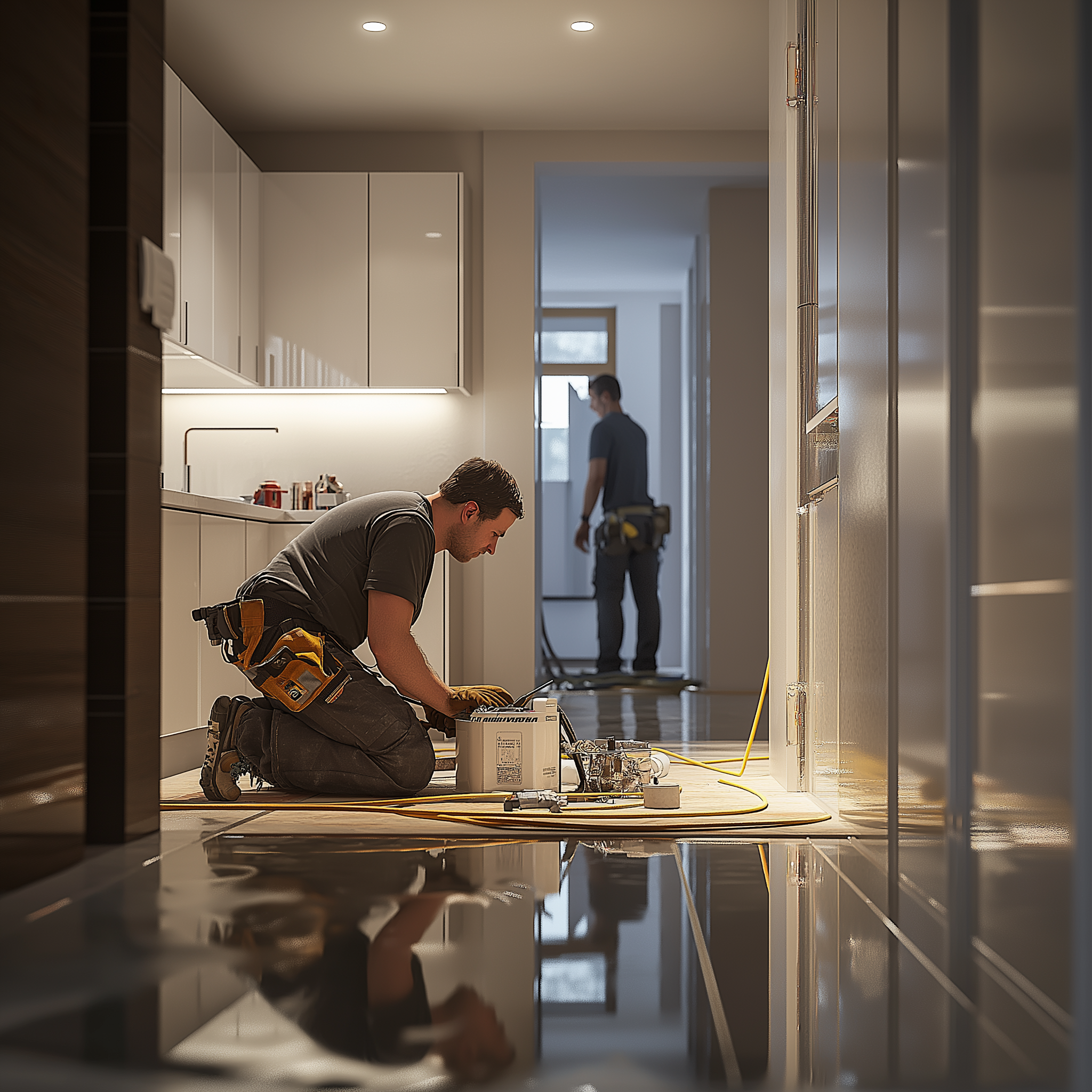Services > Water Heaters
Water Heaters Service
At Outagamie Plumber Pro, we specialize in comprehensive water heater service tailored to your needs. Whether you're considering conventional storage, tankless, heat pump, or solar water heaters, we help you choose the best option for efficiency and hot water demand.
Our team assesses factors like household size and peak usage times to recommend the right tank size or system type. We also ensure proper installation and maintenance to maximize performance and energy savings. Curious about the benefits of each type and how they can fit into your home? There's plenty more to explore on water heater solutions.

Conventional Storage Water Heaters
When selecting a conventional storage water heater, we need to consider the right tank size for our home. The size directly affects efficiency and our hot water supply, so it's crucial to match it to our household's needs. Let's explore how to determine the appropriate tank capacity for optimal performance.

Choosing the Right Tank Size for Your Home
Selecting the right tank size for your home is crucial for ensuring an adequate supply of hot water while maximizing energy efficiency. To make this decision, we need to evaluate our household's water demand based on family size and daily routines.
Typically, a family of one or two might require a 30-gallon tank, while a family of three to four usually benefits from a 40-gallon tank. Larger families, five or more, often need a 50-gallon tank or more to meet their hot water needs effectively.
It's essential to consider peak usage times, like morning showers or evening dishwashing, which can significantly impact our hot water requirements. We should also account for any additional appliances that use hot water, such as washing machines and dishwashers.

Services > Water Heaters

Water Heaters Service
At Outagamie Plumber Pro, we specialize in comprehensive water heater service tailored to your needs. Whether you're considering conventional storage, tankless, heat pump, or solar water heaters, we help you choose the best option for efficiency and hot water demand.
Our team assesses factors like household size and peak usage times to recommend the right tank size or system type. We also ensure proper installation and maintenance to maximize performance and energy savings. Curious about the benefits of each type and how they can fit into your home? There's plenty more to explore on water heater solutions.
Conventional Storage Water Heaters
When selecting a conventional storage water heater, we need to consider the right tank size for our home. The size directly affects efficiency and our hot water supply, so it's crucial to match it to our household's needs. Let's explore how to determine the appropriate tank capacity for optimal performance.

Choosing the Right Tank Size for Your Home
Selecting the right tank size for your home is crucial for ensuring an adequate supply of hot water while maximizing energy efficiency. To make this decision, we need to evaluate our household's water demand based on family size and daily routines.
Typically, a family of one or two might require a 30-gallon tank, while a family of three to four usually benefits from a 40-gallon tank. Larger families, five or more, often need a 50-gallon tank or more to meet their hot water needs effectively.
It's essential to consider peak usage times, like morning showers or evening dishwashing, which can significantly impact our hot water requirements. We should also account for any additional appliances that use hot water, such as washing machines and dishwashers.
Emergency Plumber Services
Free Estimate In 3 Easy Steps
Request a Free Quote
Request a free estimate by either calling our friendly dispatch center, open 24 hours at (920) 280-0887, or complete our short quote request form to have one of our estimators contact you to schedule a time to survey the job.

![[keyword]](https://assets.cdn.filesafe.space/AHkf8PCcGqBUyK4afXmL/media/62ac53f9-beb0-45de-84da-8aaed5221ded.png)

Receive a Written Estimate
After the job is surveyed, you will receive a written estimate outlining the job details and the cost. Just reply back with your acceptance and we'll contact you to schedule the job to be completed when it is convenient for you.
![[keyword]](https://assets.cdn.filesafe.space/AHkf8PCcGqBUyK4afXmL/media/ef839fda-e6a5-497d-849e-bc1191445385.png)
Get Your Plumbing Job Done!
Our crew of professionals will show up on the scheduled date and time to complete your job!

Tankless Water Heaters
Tankless water heaters offer a modern solution for on-demand hot water, eliminating the need for a storage tank. They heat water directly as it flows through the unit, providing endless hot water while also improving energy efficiency. In this section, we'll compare tankless systems to conventional water heaters to help you decide which option best suits your needs.
How Tankless Heaters Work
Often, homeowners are curious about how tankless water heaters operate and why they're becoming increasingly popular. Tankless water heaters, also known as on-demand water heaters, heat water directly as it flows through the unit. When we turn on a hot water tap, cold water travels through a pipe into the heater, where either a gas burner or an electric element heats it instantly. This process eliminates the need for a bulky storage tank, which is a key factor in their tankless efficiency.
One of the major installation benefits we often discuss is the space-saving design. Without a tank, these units can be mounted on walls, freeing up valuable floor space in our homes. Additionally, since they only heat water as needed, tankless water heaters can provide a continuous supply of hot water, making them ideal for larger households or homes with higher hot water demands.
Moreover, homeowners frequently experience lower energy bills with tankless systems, as they don't waste energy maintaining a reservoir of hot water. Overall, understanding how these systems work helps us appreciate their value and efficiency in modern plumbing solutions.
Tankless vs. Conventional
When considering the best water heating solution for our homes, we must weigh the advantages and drawbacks of tankless and conventional water heaters. Tankless water heaters provide hot water on demand, which means we won't run out during peak usage times. They're more energy-efficient, as they only heat water when we need it, potentially lowering our energy bills. However, the installation costs can be higher compared to conventional systems.
On the other hand, conventional water heaters store a set amount of hot water, making them suitable for larger households with consistent hot water demands. Their installation costs are generally lower, and they're easier to replace or service. However, their energy efficiency can lag behind tankless models, as they continuously heat water in the tank, even when we're not using it.
Ultimately, our choice depends on our household's hot water needs, budget, and energy efficiency goals. For those who prioritize on-demand hot water and long-term savings, tankless may be the way to go. Conversely, if upfront costs and straightforward installation are our priorities, a conventional water heater could be a better fit.
Heat Pump Water Heaters
Heat pump water heaters stand out as an energy-efficient option for homeowners looking to reduce their utility bills while maintaining a reliable hot water supply. These systems utilize heat pump efficiency by extracting heat from the air or ground, transferring it to the water, which can lead to significant energy savings compared to conventional electric water heaters.
When considering installation, we need to evaluate the space available, as heat pump water heaters require adequate airflow and a temperature range between 40°F and 90°F for optimal performance. They typically work best in moderate climates, but with proper insulation, they can function effectively in cooler areas too.
It's also essential to assess the unit's capacity to ensure it meets our household's hot water demands. While the initial installation cost may be higher, the long-term savings on energy bills and potential tax credits can make it a worthwhile investment.
Solar Water Heaters
Solar water heaters present an innovative solution for those of us looking to harness renewable energy for our hot water needs. These systems utilize sunlight to heat water, significantly reducing our reliance on conventional energy sources. The solar water heater benefits are numerous; they can lead to considerable energy savings, lower utility bills, and a reduced carbon footprint.
When considering solar water heater installation, we need to evaluate various factors, including our home's location, sunlight exposure, and water heating demands. A well-designed solar water heating system typically consists of solar collectors, a storage tank, and necessary plumbing. By working with professionals like Outagamie Plumber Pro, we ensure that the installation is executed correctly, maximizing efficiency and longevity.
Moreover, many states offer incentives for solar installations, making this a financially attractive option. It's essential to conduct a thorough assessment to determine the best system for our needs. By embracing solar water heaters, we're not just investing in our homes; we're contributing to a more sustainable future. Let's take the plunge into renewable energy and enjoy the benefits of solar water heating together!
Need to get in touch?
Free Estimate
In 3 Easy Steps
Request a Free Quote

Request a free estimate by either calling our friendly dispatch center, open 24 hours at (920) 280-0887, or complete our short quote request form to have one of our estimators contact you to schedule a time to survey the job.
![[keyword]](https://assets.cdn.filesafe.space/AHkf8PCcGqBUyK4afXmL/media/546dc333-8b96-4516-8ccc-6e3c7628127e.png)
Receive a Written Estimate

After the job is surveyed, you will receive a written estimate via text outlining the job details and the cost. Just reply back with your acceptance and we'll contact you to schedule the job to be completed when it is convenient for you.
![[keyword]](https://assets.cdn.filesafe.space/AHkf8PCcGqBUyK4afXmL/media/54a0c918-01aa-4e7a-850b-8b23b02f83b8.png)
Get Your Plumbing Job Done!

Our crew of professionals will show up on the scheduled date and time to complete your job, cleanup the debris, and leave your yard looking better than ever!
Tankless Water Heaters
Tankless water heaters offer a modern solution for on-demand hot water, eliminating the need for a storage tank. They heat water directly as it flows through the unit, providing endless hot water while also improving energy efficiency. In this section, we'll compare tankless systems to conventional water heaters to help you decide which option best suits your needs.
How Tankless Water Heaters Work
Often, homeowners are curious about how tankless water heaters operate and why they're becoming increasingly popular. Tankless water heaters, also known as on-demand water heaters, heat water directly as it flows through the unit. When we turn on a hot water tap, cold water travels through a pipe into the heater, where either a gas burner or an electric element heats it instantly. This process eliminates the need for a bulky storage tank, which is a key factor in their tankless efficiency.
One of the major installation benefits we often discuss is the space-saving design. Without a tank, these units can be mounted on walls, freeing up valuable floor space in our homes. Additionally, since they only heat water as needed, tankless water heaters can provide a continuous supply of hot water, making them ideal for larger households or homes with higher hot water demands.
Moreover, homeowners frequently experience lower energy bills with tankless systems, as they don't waste energy maintaining a reservoir of hot water. Overall, understanding how these systems work helps us appreciate their value and efficiency in modern plumbing solutions.
Tankless vs. Conventional Water Heaters: Which is Right for You?
When considering the best water heating solution for our homes, we must weigh the advantages and drawbacks of tankless and conventional water heaters. Tankless water heaters provide hot water on demand, which means we won't run out during peak usage times. They're more energy-efficient, as they only heat water when we need it, potentially lowering our energy bills. However, the installation costs can be higher compared to conventional systems.
On the other hand, conventional water heaters store a set amount of hot water, making them suitable for larger households with consistent hot water demands. Their installation costs are generally lower, and they're easier to replace or service. However, their energy efficiency can lag behind tankless models, as they continuously heat water in the tank, even when we're not using it.
Ultimately, our choice depends on our household's hot water needs, budget, and energy efficiency goals. For those who prioritize on-demand hot water and long-term savings, tankless may be the way to go. Conversely, if upfront costs and straightforward installation are our priorities, a conventional water heater could be a better fit.
Heat Pump Water Heaters
Heat pump water heaters stand out as an energy-efficient option for homeowners looking to reduce their utility bills while maintaining a reliable hot water supply. These systems utilize heat pump efficiency by extracting heat from the air or ground, transferring it to the water, which can lead to significant energy savings compared to conventional electric water heaters.
When considering installation, we need to evaluate the space available, as heat pump water heaters require adequate airflow and a temperature range between 40°F and 90°F for optimal performance. They typically work best in moderate climates, but with proper insulation, they can function effectively in cooler areas too.
It's also essential to assess the unit's capacity to ensure it meets our household's hot water demands. While the initial installation cost may be higher, the long-term savings on energy bills and potential tax credits can make it a worthwhile investment.
Solar Water Heaters
Solar water heaters present an innovative solution for those of us looking to harness renewable energy for our hot water needs. These systems utilize sunlight to heat water, significantly reducing our reliance on conventional energy sources. The solar water heater benefits are numerous; they can lead to considerable energy savings, lower utility bills, and a reduced carbon footprint.
When considering solar water heater installation, we need to evaluate various factors, including our home's location, sunlight exposure, and water heating demands. A well-designed solar water heating system typically consists of solar collectors, a storage tank, and necessary plumbing. By working with professionals like Outagamie Plumber Pro, we ensure that the installation is executed correctly, maximizing efficiency and longevity.
Moreover, many states offer incentives for solar installations, making this a financially attractive option. It's essential to conduct a thorough assessment to determine the best system for our needs. By embracing solar water heaters, we're not just investing in our homes; we're contributing to a more sustainable future. Let's take the plunge into renewable energy and enjoy the benefits of solar water heating together!
Frequently Asked Questions
How Often Should I Flush My Water Heater?
We recommend flushing our water heater at least once a year to maintain water quality and reduce sediment buildup. Regular maintenance helps ensure efficient operation and prolongs the lifespan of the unit.
What Signs Indicate My Water Heater Needs Repair?
When our water heater needs repair, we notice signs like a leaking tank, strange noises, rusty water, inconsistent temperatures, age concerns, or a malfunctioning pilot light. Addressing these issues promptly can prevent further damage.✨
Can I Install a Water Heater Myself?
You can install a water heater yourself, but water heater safety is crucial. You should follow installation tips carefully, ensuring proper connections and venting, and always check local codes to avoid potential hazards and future issues.
How Long Do Water Heaters Typically Last?
Water heaters typically last around 8 to 12 years. To maximize water heater lifespan, we recommend regular maintenance tips like flushing the tank and checking the anode rod, ensuring optimal performance and longevity for your system.
Are There Energy-Efficient Options for Water Heaters?
Yes, there are energy-efficient options for water heaters. We can explore tankless technology, which heats water on demand, and solar heating, which utilizes renewable energy, helping us save on energy costs while being environmentally friendly.
Contact Us
Service Hours
Social Media
Contact Us
(920) 280-0887
Appleton, WI 54914
Service Hours
Monday - Friday: Open 24 Hours
Saturday: Open 24 Hours
Sunday: Open 24 Hours
Social Media

2024 | All Rights Reserved
Privacy Policy | Site Map




